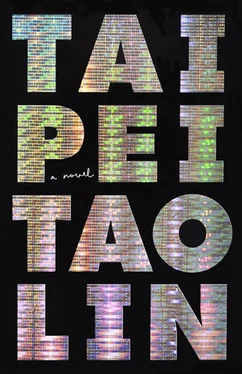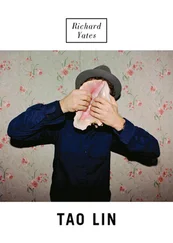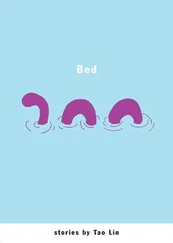“We would talk about if we were skinny,” said Maggie.
“No, because it would be too depressing,” said Paul, surprised again by the power of his mind but less than before, a little suspicious now of his own enthusiasm.
“You’re right,” said Calvin, and seemed to look at each person in disbelief — which confused Paul because he had imagined doing that himself.
“We would talk about food,” said Maggie.
“I feel like people are staring at me,” said Paul.
“Me too, a little,” said Erin.
“I wish I could see how Erin and I are like on mushrooms now,” said Paul.
“Me too,” said Erin.
“I was going to bring my camera but didn’t want to get it wet,” said Maggie.
“People are staring at me weird, except Erin,” said Paul. “I wish someone was recording us.”
“Just ask me later and I’ll tell you,” said Maggie.
“Later,” said Paul, confused. “When?”
Calvin said it was time for Maggie to go home and they left seemingly instantly. Paul was aware of having waved at them and of having meekly said “bye, Maggie,” to himself, he realized, as he continued staring at where they had gone out of view — to postpone interacting with Erin, who’d been abnormally quiet most of the night, he uncertainly realized with increasing anxiety. Maggie should have stayed longer, because he and Erin were only visiting a few days, he thought earnestly for a few seconds before realizing, with only a little sheepishness, that Maggie had her own desires, separate from those of anyone else, which she expressed through her actions. Paul knew that, because he kept thinking about Maggie, his demeanor and behavior, when he finally acknowledged Erin, would appear, if not obviously feigned, to convey “I want to be elsewhere” or “I want to be doing things in service of being elsewhere,” which Erin would easily discern, if she hadn’t already. Paul moved his mouth to where water was bubbling and, partly facing away from Erin, said something about it feeling “nice.” Erin moved her mouth to a different area of similar bubbling. After ten to fifteen minutes Calvin appeared and said “you guys can come inside now, Maggie went home,” seeming to have assumed they had been waiting for his approval to go inside. Paul had begun feeling comfortable and was confused why they couldn’t — and weren’t asked if they wanted to — stay in the hot tub.
After showering in separate bathrooms Paul and Erin sat on Calvin’s carpeted floor. Calvin, covered by blankets up to his underarms, with his upper body propped by pillows, seemed like he was cautiously testing an unexpected feeling of health and energy while on his “death bed.” Maggie, he said in a worried and slightly fascinated voice, had wanted to perform oral sex on him, but he hadn’t been aroused, which had upset her maybe. Erin said it was normal for sexual desire to leave sometimes. Calvin said he and Maggie hadn’t had sex in four months. Paul said that seemed normal because they’d been together three years and that Calvin’s drug use — Percocet, Codeine, Klonopin, Adderall — the past few months, based on their emails and texts, seemed high, which probably had an effect. Then they discussed what to do now, for an activity, but couldn’t decide — each person seemed committed to not deciding — and became locked into what felt like a three-way staring contest, which they mutely sustained, each person alternating between the other two, for thirty to forty seconds, until Paul bluntly said he wanted to “go for a walk with only Erin, outside,” and, after mumbling something incoherent about mushrooms — vaguely wanting to convey it was uncomfortable while on mushrooms to be around people not on mushrooms — quickly gained Erin’s assent and repeatedly positioned himself to displace, or push, her toward where he was going, until both were outside the room, in a dark hallway, where they huddled together and maneuvered grinning to winding stairs, which they descended holding hands, toward the front door.
They walked down the driveway into the upper-middle-class neighborhood with their inside arms folded up and against each other. Most front yards had one or two fashionably sculpted trees and two or more colorful Boy Scouts — like patches of flowers and plants in independent organization. Paul saw, in a side yard, a pale fence with the colorless, palatially melancholy glow of unicorns and remembered how in Florida, in the second of his family’s three houses of increasing size, both his neighbors had built fences — rows of vertical, triangular-topped slats of wood that had seemed huge, medieval — around their backyards. Paul said he felt like he was in Edward Scissorhands and they sat on a concrete embankment facing the street with their feet on a sidewalk. Paul slightly looked away as he said “there’s so many stars here” without much interest.
Erin pointed and asked if one was moving.
“In place, maybe,” said Paul uncertainly.
“It looks like it’s vibrating,” said Erin.
“It’s, um, what thoughts do you have about UFOs?” said Paul looking away, as if not wanting Erin to hear him clearly. “I’m doing it. . I’m saying stereotypical things that people say while on mushrooms.”
“That’s okay. UFOs are interesting.”
“I know it’s okay,” said Paul, and asked if Erin had experienced “any UFO things.” Erin said she wore purple and put glitter on her eyes every Friday in fourth grade because she thought, if she did, aliens would notice and take her away.
“That seems really good,” said Paul feeling emotional. “All purple?”
“No. It just had to be one thing that was purple.”
“Where did you think they would take you?”
“I don’t think I thought about that,” said Erin. “Just ‘away.’ Anywhere.”
“What. . did your classmates, or other people, think?”
“I’ve never told anyone.”
“Really? But. . it’s been so long.”
“I didn’t have anyone to tell, really.”
“You haven’t told anyone except me?”
“No. Let me think. No, I haven’t.”
Paul had begun to vaguely feel that he already knew of a similar thing — something about purple glitter and fourth grade, maybe from a children’s book — or was he remembering what he just heard? His voice sounded bored, he thought, as he told Erin about when, as a fourth or fifth grader, he really wanted to see a UFO and was on a plane and saw a brown dot and, without any excitement or sensation of discovery, repeatedly thought to himself that he’d seen a UFO. “I think I was aware at first that I was ‘faking’ it,” said Paul uncertainly. “But. . I think I convinced myself so hard that I made myself forget that part. . when I was aware, and I think I really believed I saw a UFO.”
“Whoa. Did you tell anyone you saw a UFO?”
“I don’t think I’ve ever told anyone. I don’t think I cared if anyone knew. I was just like, ‘I saw a UFO.’ I think I was extremely bored. I was like a bored robot.”
The next night Erin and Paul met Cristine, 22—a mutual acquaintance from the internet — and Cristine’s friend Sally, 22, in a public park that was closed for the night. Cristine sold Paul eight 36mg Ritalin and ten psilocybin chocolates, wrapped in tinfoil, like little hockey pucks. They each ate a chocolate and walked through the park, to the end of a beach, where they sat in the gently fluorescent light of a half moon that looked like a jellyfish photographed, from far below, in mid-propulsion, its short tentacles momentarily inside itself.
In the distance, Cleveland’s three tallest buildings, each with a different shape and style of architecture and lighting, were spaced oddly far apart, like siblings in their thirties, in a zany sitcom. After spending their lives “hating” one another, in a small town, they moved to different cities and were happy, but then got coincidentally transferred by their employers to the same medium-size city. They were all named Frank. Paul felt reluctant to say anything weird because Cristine and Sally were behaving normally, with earnest expressions, as if pretending they weren’t on mushrooms, except sometimes one would mention seeing beautiful colors, increasing Paul’s apprehension because earlier he and Erin had bonded over feeling alienated by people who focused on visuals, instead of people, while on hallucinogens. Deciding, after around fifteen minutes, to drive somewhere in two cars, they walked on the beach toward the parking lot. The clear moonlight sometimes fleetingly appeared, on Lake Erie, to their left, as thin layers of snow, resting on the surface of the water, as if painted on, or briefly riding the shoreward, foamy fronts of tiny waves before vanishing. Sally’s car, on the highway, got a flat tire. Paul and Erin couldn’t stop grinning, due to the mushrooms, sitting on a sidewalk in downtown Cleveland, waiting for AAA, as a frowning Sally, whose car had a missing window covered by a garbage bag, persistently bemoaned her situation without looking at anyone. Cristine, grinning sometimes at Paul and Erin, drove everyone, in Erin’s car, to Kent State University, where Paul and Erin walked far behind Cristine and Sally, on a slightly uphill sidewalk. “When you said that thing about glitter and purple clothing I felt vaguely like I already knew about it,” said Paul. “You really haven’t told anyone?”
Читать дальше












